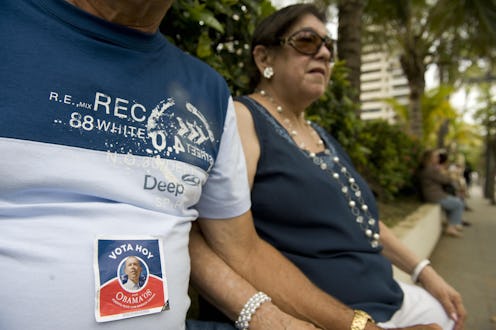News
Puerto Rico's Confusing Primary Delegate Rules
Primary season may be drawing to a close, but on the Democratic side of the aisle, the fight for delegates isn't showing any signs of winding down yet. Democrats in Puerto Rico will be voting on June 5 to determine how their commonwealth will be represented in Philadelphia. So, is the Puerto Rico primary winner take all? The island territory will likely end up splitting their delegation to the Democratic National Convention, but in this contest, the party infrastructure will have a larger say on the delegate selection process.
Puerto Rico's delegate selection process is a hybrid of proportional representation based on primary results, and then on the composition of the elected delegation themselves. It's a bit tricky, but bear with me. The commonwealth's delegation to the DNC will be 67 members; seven of that total are unbound superdelegates, or "party leaders and elected officials" in the official party parlance. These delegates have nothing to do with the will of the voters on June 5 at all.
Out of the remaining 60 delegates, there are three other "classes" of delegation members; 40 delegates are selected based on the results of the primary at the level of senatorial district. And things get a little more specific among districts.
Since Puerto Rico doesn't have any official congressional representation, the eight senatorial districts correspond to the districts represented in the territorial legislature's upper house. Five of the eight districts will elect four delegates each, while the larger districts of San Juan, Bayamon, and Carolina will elect eight, six, and six delegates, respectively.
It is important to note that Puerto Rico does have a threshold requirement to qualify for any delegates to be awarded at all, which is 15 percent. Candidates who fail to meet that threshold on a district-by-district basis will not be able to qualify for any delegate representation at all. This means that it's highly unlikely that former candidate Martin O'Malley and businessman Rocque de la Fuente will gain any delegates from this contest.
That still leaves a total of 20 delegates left to round out the group and 13 of them will be classified as at-large delegates. The composition of this part of the delegation will be based on the presidential preferences of the 40 bound delegates mentioned above. The final seven members of the delegation will be made up of party leaders and elected officials — like the superdelegate delegation above — but these seven will be bound to the proportional results of the initial group of 40 delegates, too.
If this all seems like a confusing, opaque process, that is because it kind of is. So, to wrap up: Puerto Rico's delegation to the DNC will be comprised of four different classes of delegates. Some will be elected, some gain their place by virtue of their elected office; some will be bound to vote for their stated presidential preference candidate at the DNC, others have the freedom to chose who to support based on their own convictions. A complicated process, but one that party leaders probably feel is justified in an open primary situation during a turbulent year.
